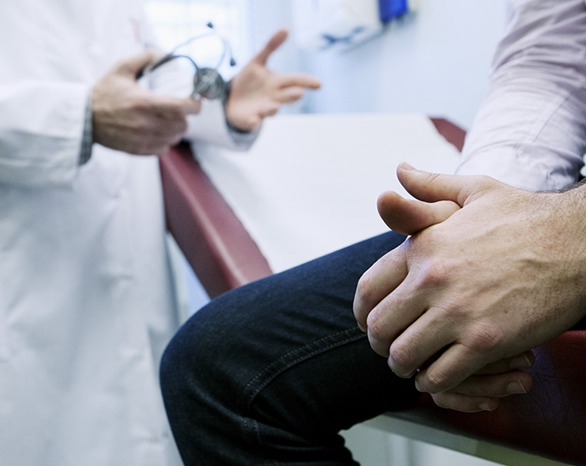Prostate Cancer

Prostate cancer is a disease in which malignant (cancer) cells form in the tissues of the prostate.
The prostate is a gland in the male reproductive system located below the bladder and in front of the rectum. It is about the size of a walnut and surrounds the urethra (the tube through which urine flows from the bladder to the outside). The prostate produces a fluid that makes up part of semen.
According to the National Cancer Institute, prostate cancer is the second most common form of cancer affecting men in the United States. Approximately 221,000 men in the United States were diagnosed with prostate cancer in 2003. More than seventy percent of men diagnosed with prostate cancer each year are over the age of 65. African-American men are at higher risk for prostate cancer than white men.
In Central America and the Caribbean, prostate cancer is the leading cause of cancer mortality in men.
Prostate cancer incidence and mortality rates vary between countries. The highest rates of prostate cancer incidence and mortality are found in the Caribbean, with Barbados, Trinidad and Tobago and Guyana being the most prominent.
The lowest mortality rates for this type of cancer are found in the United States and Canada, despite their high incidence rates.
There are no noticeable symptoms of prostate cancer while it is in the early stages. In more advanced stages, symptoms include urinary difficulty or frequency, blood in the urine, or bone pain.

Unfortunately, there are no symptoms of early prostate cancer.
Frequent or uncontrollable urination
Complications when trying to start or stop urine flow
Urine loss during body contractions
Painful burning sensation when urinating and/or ejaculating
Blood in urine and/or semen
Swelling of the lower extremities of the body
Sudden weakness or paralysis in the lower limbs
Cancer growth in the prostate creates a blockage, which can lead to symptoms like these.
Cancer itself does not cause these symptoms. However, if you are experiencing any of these symptoms, call your doctor to discuss them further.
Regular screening and screening can identify prostate cancer in its early stages.
Early identification of prostate cancer allows for early treatment resulting in fewer side effects, treatment with a better prognosis, and a greater chance of being cured.
Risk Factors Related to Prostate Cancer
A risk factor is anything that affects your chances of getting a disease.
However, having one or even several risk factors does not mean that you will get the disease. Researchers have discovered several risk factors that can affect a man's risk of developing prostate cancer.
The risk of developing prostate cancer increases with age. Prostate cancer rarely develops in men under 40 years of age, and most cases occur in men over 65 years of age.
AGE
RACE / ETHNIC ORIGIN
GEOGRAPHY
The geographic area where one lives can have a huge effect on the risk of developing prostate cancer. Men residing in North America, northwestern Europe, Australia, and the Caribbean islands are at highest risk for developing prostate cancer, and it is less common in men in Asia, Africa, Central America, and South America. For example, the risk of developing prostate cancer in men residing in the United States is 17% versus a risk of 2% for men living in rural China. However, when men from countries such as China move into Western culture, the risk of developing prostate cancer increases substantially. The factors that contribute to these dramatic changes in prostate cancer risk have not yet been determined.
Hispanic men have a risk similar to that of the general population, although the mortality rate from this disease has not decreased in recent years as it has in Caucasian and African-American men.
GENETICS / FAMILY HISTORY
DIET
Several diet-related factors have been studied in recent years to better understand their role in affecting the risk of developing prostate cancer. Men who eat rice, vegetables, and soy products have been shown to be less likely to be diagnosed with prostate cancer while men who tend to eat a lot of red meat or high-fat dairy products appear to have a higher chance of developing prostate cancer. However, these men also tend to eat less fruits and vegetables, so doctors and scientists have not been able to come to a conclusion as to which of these factors are truly responsible for raising the risk of prostate cancer.
Obese men – those whose body mass index is greater than 32.5 – are 33% more likely to die from prostate cancer.